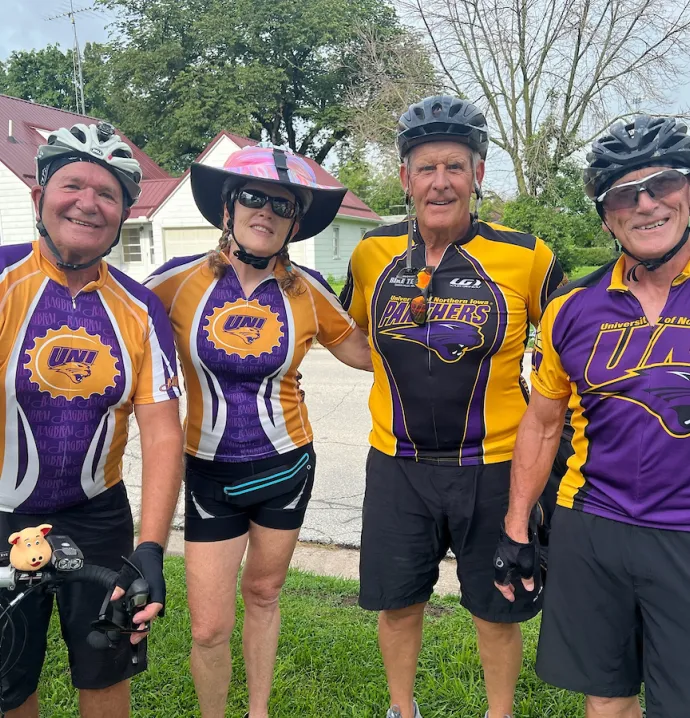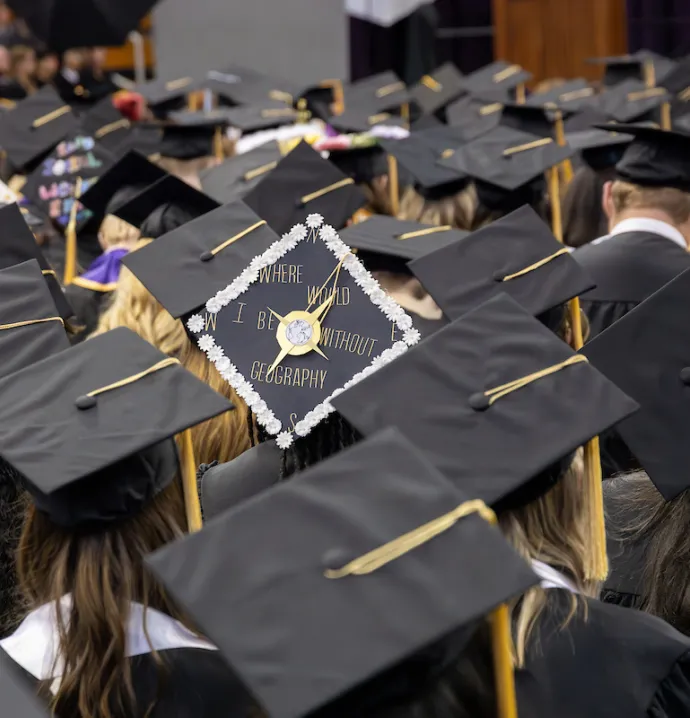UNI bands together in wake of COVID-19
UNI bands together in wake of COVID-19
For UNI senior Cassidy Flory, public health is a calling. Two of her sisters are nurses, her mother works with disabled adults and Flory, a public health and gerontology major, hopes to work in a public health department someday.
Nothing - not even a global pandemic - is going to change that.
And so, despite having to rush back to Cedar Falls last week to move out of her dorm, the Clear Lake native is still working dozens of hours a week at her local assisted living facility while balancing her online UNI classes. She dispenses medications, helps with activities and does her best to cheer up residents who can no longer see their families.
“I’ve always wanted to help,” Flory said in a phone interview. “That’s something that’s really important to me. I think people are getting really hung up on what they can’t do rather than what they can do.”
In a few short weeks, the global coronavirus pandemic has upended life in America. But interviews with numerous UNI students, faculty and staff show that although campus life is on hiatus, the fabric of what makes UNI a community remains intact. Panthers in large ways and small are doing what they can to help each other through one of the most disjointing periods in recent history.
That’s why one professor is on standby waiting to see if she’ll be deployed this summer to a field hospital in California. Why another launched a project collecting donated art supplies to provide some cheer to elderly nursing home residents whose lives have become more circumscribed.
UNI, along with Iowa’s two other regent institutions, has begun fundraising efforts for a Student Emergency Fund, Students First Scholarships Fund as well as Panther Pantry - all aimed at helping students get through what has already become a financially devastating period for many. (Donations can be made at https://pawprint.uni.edu/g/studentsupport)
“UNI has always been a very special place, a top-notch university with global impact but small enough for our community to truly care for one another,” said UNI President Mark E. Nook said in a recent video message. “That spirit continues and in fact grows in these challenging times.”
Faculty and staff are showing that spirit too. Many campus services - including counseling, mentoring and homework help - have moved online. And the IT department has loaned out 106 laptops so far to students and faculty who need remote access to online resources.
“Mental health issues don’t go away during stressful times like this, so we are working together to take care of people the best we can with the technologies available,” said counseling center director Jennifer Schneiderman. “We appreciate everyone’s patience as we all adjust to our new processes.”
Schneiderman said students can meet with one of the center’s eight counselors over Zoom or call the counselor on call at 273-2676.
Gender and Sexuality Services is encouraging LGBTQ+ students to join its virtual community on Discord, a text and voice chat available on a desktop browser or as an app. Students can find the email to contact for an invite online. The Center for Multicultural Education is also arranging virtual programming and its mentoring programs will continue virtually.
UNI’s Institute for Decision Making and Strategic Marketing Services developed a survey to help the state gauge the impact of COVID-19 to Iowa businesses and UNI’s Business and Community Services continues to be an important resource for the state’s small businesses and communities.
While Rod Library remains closed, the library has launched a Zoom tutoring center with half-hour appointments available for math/statistics, science, writing and academic coaching. Questions can be directed to TheLearningCenter@uni.edu Students also have access to Smarthinking, a 24/7 online tutoring service available at tlc.uni.edu
Professors are making the same efforts this week to bridge those gaps online. English professor Jeremy Schraffenberger reached out to the UNI community last week in a YouTube message that included him reading a poem called “The Library” by Wyatt Townley.
“Come home to where
your story takes a deeper turn through grace....
A home within a book is anywhere
you are...."
“We’re going to be connecting via screen but we’ll also be connecting through books,” he said in the video.
Public health professor Michele Devlin is doing her part to help, working with the International Red Cross as a global health consultant advising on responses to COVID-19 pandemic. She’s also been put on standby by Team Rubicon, a nonprofit serving veterans, to be deployed this summer to a large field hospital in California to assist with medical care and public health issues.
“It’s really been a whirlwind response,” she said. “All the public health faculty are working overtime to teach their students, help the community, and serve the profession through numerous activities.”
Among them was a public COVID-19 panel hosted by UNI that allowed the public to ask experts including Devlin questions about the pandemic. The event was livestreamed and posted online.
UNI gerontology professor Elaine Eshbaugh got the idea for the Northern Iowa Gerontology Nursing Home Art Project, which she launched last weekend, while talking to a student whose grandfather loves adult coloring books.
Eshbaugh realized that with nursing homes on lockdown her budget for presentations there couldn’t be used, so she decided to put together boxes of art supplies for the elderly. That money was enough to supply about 10-15 nursing homes, and, after sharing a Target registry she created, she has since received enough supplies to double the number of facilities served.
Although she’s grateful for the community support, Eshbaugh said she’s been most impressed by her students like Flory who are working directly with the elderly - perhaps the most vulnerable population during a pandemic - despite the risk they themselves face.
And their work goes beyond their healthcare duties. Eshbaugh said she knows some students who are staying after their shift and offering their cell phones to residents who haven’t been able to speak with their families on video.
“I’m really proud of our students,” she said.




